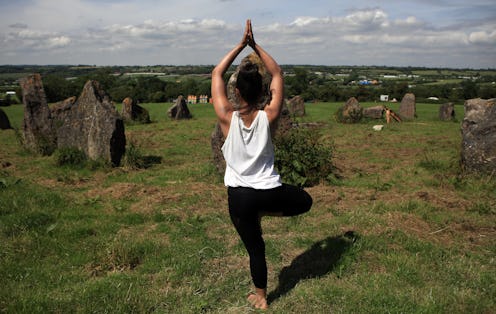Life
Ways To Ease Your Anxiety Without Medication
We all get a little anxious here and there, but sometimes that anxiety can become overwhelming. Whether you’re pushing to get through your coursework or your job is making your head spin, the constant worrying and stress can take a toll on your wellbeing. Constant anxiety can get in the way of everyday activities, from your diet, to your social life, and even your sleep habits.
In some cases, medication may be the right answer, but there could be variety of reasons why someone wouldn’t want to turn to pills. Taking medication can include unwanted side effects, chemical dependence, or even loss of everyday emotions.
“Drugs do not ‘cure’ anxiety disorders and may have side-effects or production of ‘tolerance,’ requiring higher doses for the same effect,” says Dr. Bruce Levine, a Board-Certified Clinical Psychologist at the UCLA School of Medicine. “Given these facts, many people may choose non-drug treatments to either avoid, supplement, replace or eliminate the need for medication.”
While medication may seem like a quick fix, there are a variety of things you can do at home to get rid of that gnawing, uncomfortable feeling of uneasiness. If the thought of even taking an Advil makes you cringe, here are five helpful ways to get rid of anxiety without a having to get a prescription.
EXERCISE
Physical exercise can not only help get rid of your anxiety in the present moment, but it also helps you deal with your emotions in the long run. Regular exercise has been shown to improve mood, help with sleep patterns, provide stress relief, and also improve self-esteem. Research has shown that even a short 10-minute walk can be as beneficial for anxiety as more vigorous exercise, so if you are feeling uneasy, taking a quick walk around the block might be a helpful solution.
MEDITATE
Meditation isn’t just for hippies. Practicing mindfulness meditation can be more powerful in quelling anxiety symptoms than general stress management techniques, studies have found. By sitting quietly and focusing on their awareness, people experienced improved anxiety, less stress, and better eating and sleep habits. There are different levels of meditation, from sitting in silence to hours to just being aware of your thoughts and not trying to change them, but starting somewhere can have profound effects on your anxiety levels.
Try: Color Me Calm: 100 Coloring Templates for Meditation and Relaxation, $10, Amazon
LIMIT YOUR SOCIAL MEDIA
Recent studies have found that looking at social media can raise people’s levels of anxiety. “People look at Facebook and Instagram, and it makes them more depressed because they’re comparing their lives to other people,” says Lindsey Rosenthal, a Los Angeles-based Individual and Couples psychologist Try to stay off these social media sites to avoid comparing yourself to people’s best parts of themselves or to avoid getting that dreaded fear of missing out.
ELIMINATE CAFFEINE
Although coffee has its benefits, caffeine consumption can actually worsen anxiety symptoms or even create anxiety in situations where you wouldn’t normally be anxious. Caffeine is a stimulant that can trigger a fight or flight effect in your body as well as trigger insomnia, so you might want to consider putting down that cup of joe if you’re feeling a little anxious.
GET TO THE ROOT OF YOUR FEELINGS
“The best way to deal with anxiety is to figure out what the underlying fear of your anxiety is,” says Rosenthal. “Then you have to change your pattern of thinking.” It can be easy to fall victim to the constant pressure of having a stable job, financial security, and something important going on in your life, but try for a moment to stop thinking about these things and just be, Rosenthal suggest. “Be aware of the conversations in your head and don’t try to control anything you can’t control.”
